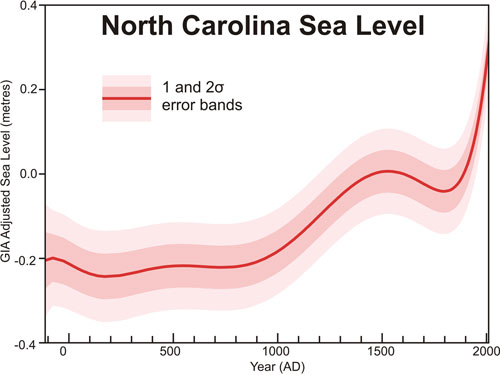North Carolina Lawmakers Turning a Blind Eye to Sea Level Reality?
Posted on 28 June 2012 by Rob Painting
Ruler of England, Sweden, and Norway at one time, the accomplishments of King Canute (985-1035AD) were many and it seemed to some of his followers that he was all-powerful. In order to dispel such a notion, and to demonstrate the limitations of human power and influence, King Canute had his throne set by the sea side and commanded the incoming sea to turn back. When the sea paid him no heed his point was made.
The moral of that tale seems to have eluded lawmakers in North Carolina, USA who recently attempted to make it illegal to consider accelerated rates of sea level rise in future planning assessments. Sadly, as with Canute, the sea won't pay any attention to the North Carolina legislature, whether they are successful in turning a blind eye to reality, or not. Professor John Bruno, being a North Carolina resident, has taken a keen interest in these shennanigans, and lays out much of the background story at his blog SeaMonster here, here, here and here.
Quite ironically, the East Coast of the United States is one of the regions on Earth that are likely to see much greater-than-average rates of sea level rise throughout the 21st Century and beyond. It just so happens that the US East Coast is sinking (more on this in later posts) as a consequence of the loss of the giant Laurentide Ice Sheet, which once covered the upper North American continent at the height of the last Ice Age (Glacial Maximum).
For some perspective, current rates of North Carolina sea level rise within the conext of the last 2000 years is shown below. A rapid acceleration of sea level rise at North Carolina in the 20th Century is very hard to miss.

Figure 1 - Sea level reconstruction by Kemp (2011) using sediment from salt marshes in North Carolina.
Sea level rise - the "Big Picture"
Of all the consequences of global warming one might expect that sea level rise, through the contribution of melting land-based ice, would be one of the easiest to grasp. The general outline is very simple; 65-70 metres of future global sea level rise are locked up in the vast Greenland and Antarctic Ice Sheets and, as the world warms, more land-based ice will melt and end up in the ocean, raising global sea levels.
But even so, measuring and accounting for sea level change over time is an extraordinarily complex process. Not only do the oceans expand as they warm, but over both short and long time frames regional variation can be quite different to the global average sea level trend. Such is the case with North Carolina, where the sea would be inundating the coast even without global warming, because the coastline itself is sinking.
This complexity, and the sometimes seemingly counter-intuitive regional sea level trends, allows climate science contrarians to confuse uninformed readers with cherry-picked pieces of information. My intention is, over a number of blog posts, to explain the 'big picture' of global sea level rise and how it has evolved over time - to essentially make plainly understood why sea level isn't level. Armed with this knowledge, we can then see how truly absurd the North Carolina proposals are, and why coastal North Carolina residents and lawmakers should be taking scientific advice very seriously.
Update: North Carolina House of Representatives does u-turn and torpedoes proposed sea level amendment.
Part 2 - This Elastic Earth (What is Glacial Isostatic Adjustment?)































 Arguments
Arguments























 0
0  0
0






Comments